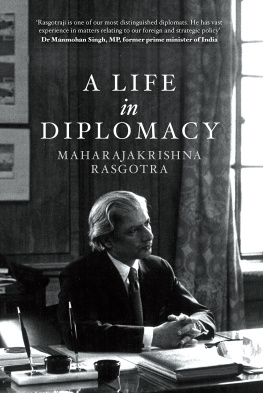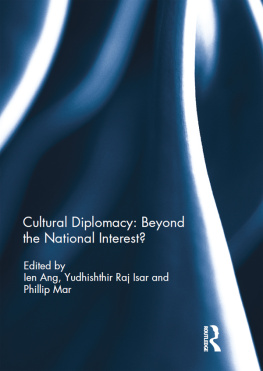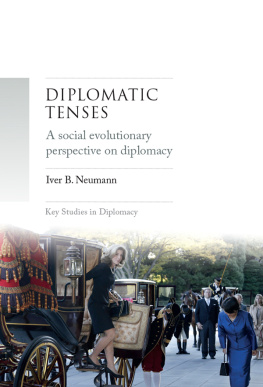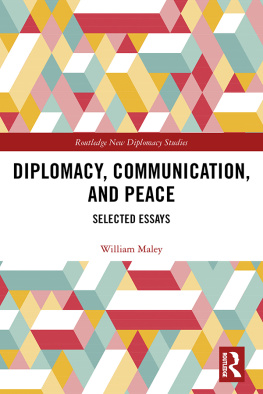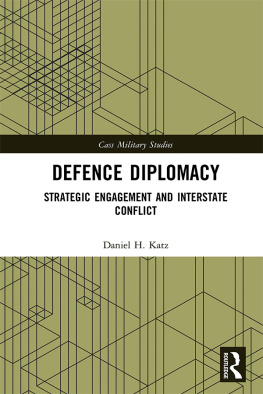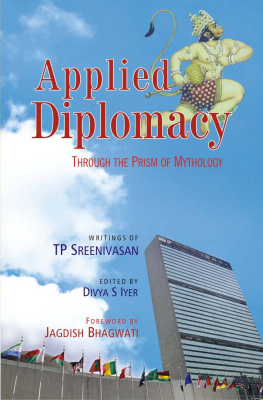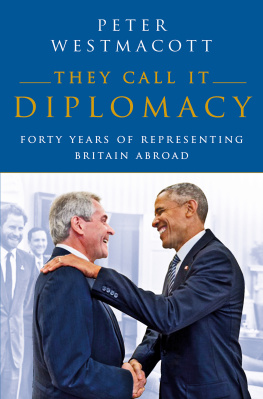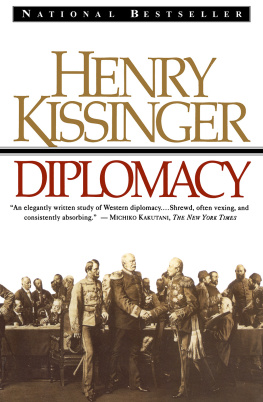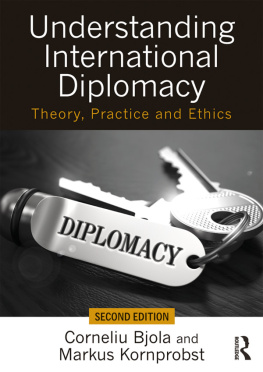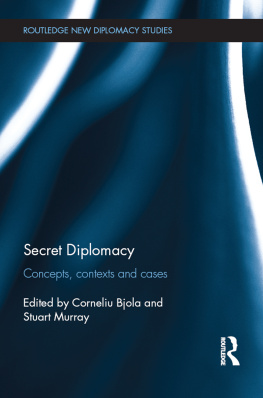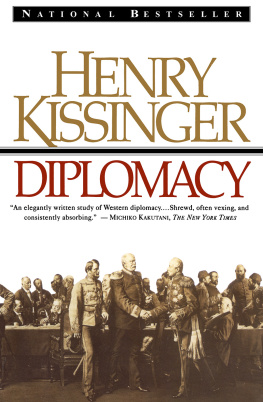Maharajakrishna Rasgotra - A Life in Diplomacy
Here you can read online Maharajakrishna Rasgotra - A Life in Diplomacy full text of the book (entire story) in english for free. Download pdf and epub, get meaning, cover and reviews about this ebook. year: 2016, publisher: Penguin Books Ltd, genre: Politics. Description of the work, (preface) as well as reviews are available. Best literature library LitArk.com created for fans of good reading and offers a wide selection of genres:
Romance novel
Science fiction
Adventure
Detective
Science
History
Home and family
Prose
Art
Politics
Computer
Non-fiction
Religion
Business
Children
Humor
Choose a favorite category and find really read worthwhile books. Enjoy immersion in the world of imagination, feel the emotions of the characters or learn something new for yourself, make an fascinating discovery.
- Book:A Life in Diplomacy
- Author:
- Publisher:Penguin Books Ltd
- Genre:
- Year:2016
- Rating:3 / 5
- Favourites:Add to favourites
- Your mark:
- 60
- 1
- 2
- 3
- 4
- 5
A Life in Diplomacy: summary, description and annotation
We offer to read an annotation, description, summary or preface (depends on what the author of the book "A Life in Diplomacy" wrote himself). If you haven't found the necessary information about the book — write in the comments, we will try to find it.
A Life in Diplomacy — read online for free the complete book (whole text) full work
Below is the text of the book, divided by pages. System saving the place of the last page read, allows you to conveniently read the book "A Life in Diplomacy" online for free, without having to search again every time where you left off. Put a bookmark, and you can go to the page where you finished reading at any time.
Font size:
Interval:
Bookmark:




PENGUIN BOOKS

PENGUIN BOOKS
To Kadambari, my lifes companion and counsellor, and co-sharer of the burdens of my tasks
Now the last day of many days
All beautiful and bright as thou,
The loveliest and the last, is dead:
Rise, Memory, and write its praise!
Upto thy wonted work! come, trace
The epitaph of glory fled,
For now the Earth has changed its face
A frown is on the Heavens brow.
P.B. Shelley, The Recollection

When I finished with government service in March 1990, I took a firm decision not to write a book. I was simply too tired to write any more: In a career of nearly forty years in the Indian Foreign Service, I must have filled several reams of paper with my writingsoffice memoranda, reports of various kinds, policy notes, special dispatches on my talks with foreign heads of state/government. I recall all this not to claim credit for having contributed anything of great value to the archives of the ministry of external affairs, but simply to confess to a state of overpowering writing fatigue. Great was my relief when fairly early in my term as foreign secretary, Prime Minister Indira Gandhi told me not to send her any files, but personally discuss problems, issues and required policy initiatives with her, and implement the decisions reached in such discussions.
I held to that resolve for twenty-four years, till one day towards the end of 2013, the director general of the Indian Council of World Affairs (ICWA), Ambassador Rajiv Bhatia, asked me to give a talk at the council about what I had seen of India and the world in my time, the origins and development of Indias Foreign Office, the Indian Foreign Service and how we dealt with important global issues and problems of international relations of direct interest to India etc. In the weeks and months following my extempore talk at the ICWA, I was overwhelmed with approaches from young scholars, university teachers, some of my former colleagues in the Indian Foreign Service and others interested in international relationsall urging me to write a book on what I had spoken about at the ICWA. It was all new to them, they said, as there was little by way of comprehensive eyewitness accounts of important developments in international relations and the successes and failures of Indias foreign policy in the first half century of Indias life as an independent nation. Weakness possessed me, and I promised to give thought to their suggestions.
A Life in Diplomacy was written mostly from memory in ten months, from December 2014 to September 2015. I had not kept any official papers with me; nor did I keep a diary. So I had to depend on my memory, which is still good. As foreign secretary, I had to sit in on Prime Minister Indira Gandhis important meetings with foreign VIPs. I never took notes on such occasions but later that day, or even a few days later, I would dictate from memory a near-verbatim record of the meeting, whatever its length, and send the same to the prime minister. On the second such occasion, she asked me whether I had used a small recorder in those meetings which, of course, was not the case. A bright young IFS officer, Arif Khan who headed my office for two years when I was foreign secretary, used to say that a guardian angel had implanted a mini recorder and a tiny camera in my head to bless me with an audio-visual memory.
The book is not my autobiography, though I have included in it a chapter about my early life, which shows that there was nothing in my upbringing to qualify me for the diplomatic profession and that there are opportunities galore for young men and women of humble origins to rise through hard work and serve the country in positions of responsibility in a growing number of unfamiliar fields of work.
My personal participation in the events of the period figures in the book here and there, but it is more a story of India in that period, of the trials and tribulations it faced, of the men and women who defined its policies and shaped its destiny and its role and influence in the world. It was an interesting but not an easy time of mutual adjustment between the world and India, a big new entrant in it with its own interests and its humanist goals and ideals influenced by its millennial tradition. Thus, to a certain degree, the book is also the story of the world of those times to the extent circumstances enabled me to observe it first-hand.
The world in which India awoke to freedom was not an entirely friendly one. In particular, the first two-and-a-half decades of Independence were a period of constant struggle to overcome the hostility of one or another great power. We have come a long way since then. Today there is hardly an area of activity in which the world can do without India: Indeed, today, the world wants India to succeed and wants to be a partner in its success.
I hope this book will fill at least some of the gaps in the knowledge of that period. It is also my hope that it does not disappoint those whose insistence drove me to this endeavour.
New Delhi
1 December 2015


At the beginning of the era of Independence, by way of a foreign policy establishment, India only had Jawaharlal Nehru. Nehru was the foreign minister who was without a Foreign Office and without a Foreign Service to represent India abroad. But he had a foreign policy which he spelt out in a steady stream of hitherto unheard of ideas, about the nature of external relations and a series of actions, which he launched in the pursuit of that policy and its goals. And though he was without a Foreign Office and without a corps of trained diplomats to elaborate and project his ideas abroad, the world listened to him with attention when he spoke because his voice was the voice of an India which the modern world had not heard for two hundred years.
In fact, Nehru had enunciated his foreign policy for India even before the country became independent. On 7 September 1946, five days after joining the Governor Generals Executive Council as vice chairman and member in charge of external affairs, Nehru proclaimed that policy and its immediate goals in the following words:
We propose, as far as possible, to keep away from the power politics of groups, aligned against one another, which have led in the past to two world wars and which may again lead to disasters on an even vaster scale...
We believe that peace and freedom are indivisible and the denial of freedom anywhere must endanger freedom elsewhere and lead to conflict and war. We are particularly interested in the emancipation of colonial and dependent countries and peoples, and in the recognition in theory and practice of equal opportunities for all races...
Font size:
Interval:
Bookmark:
Similar books «A Life in Diplomacy»
Look at similar books to A Life in Diplomacy. We have selected literature similar in name and meaning in the hope of providing readers with more options to find new, interesting, not yet read works.
Discussion, reviews of the book A Life in Diplomacy and just readers' own opinions. Leave your comments, write what you think about the work, its meaning or the main characters. Specify what exactly you liked and what you didn't like, and why you think so.

